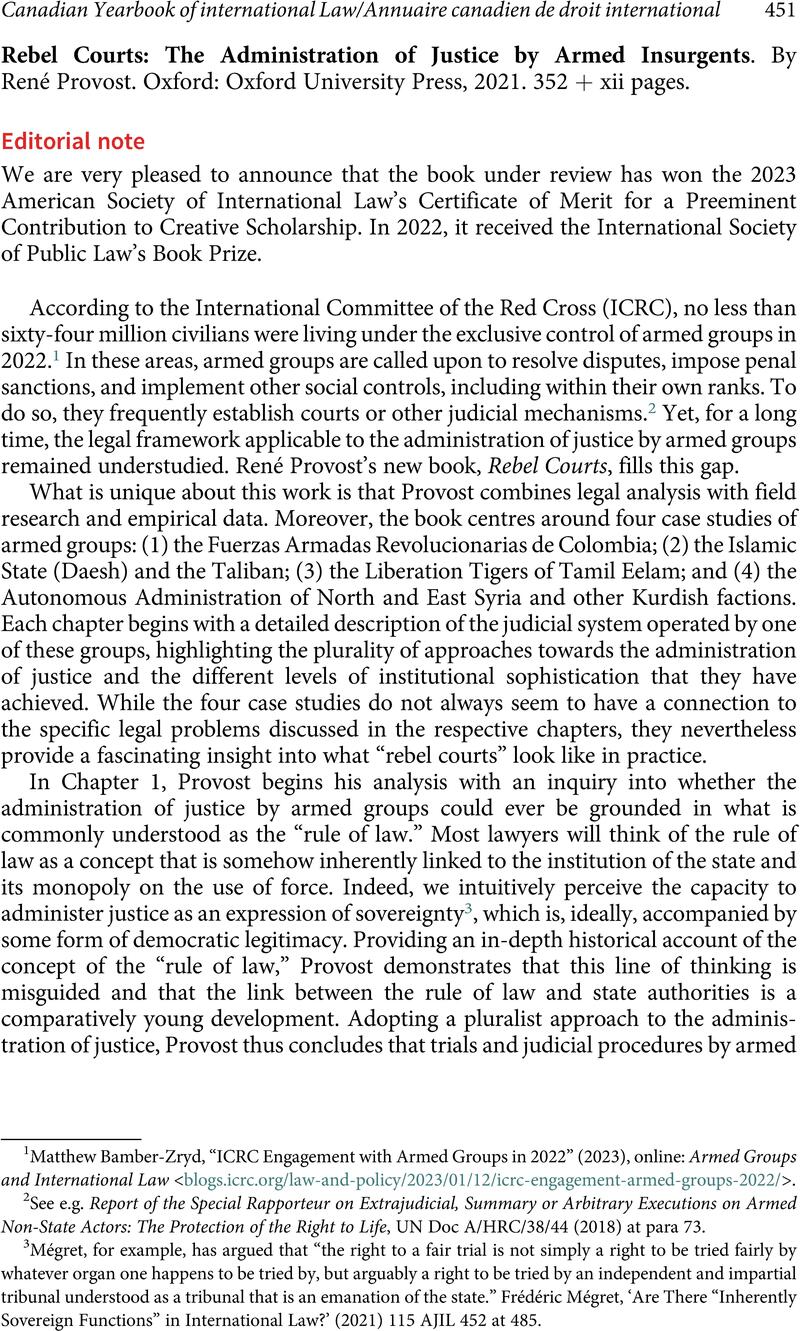No CrossRef data available.
Article contents
Rebel Courts: The Administration of Justice by Armed Insurgents. By René Provost. Oxford: Oxford University Press, 2021. 352 + xii pages.
Review products
Published online by Cambridge University Press: 19 May 2023
Abstract

- Type
- Book Reviews/Recensions de livres
- Information
- Canadian Yearbook of International Law/Annuaire canadien de droit international , Volume 60 , November 2023 , pp. 451 - 454
- Copyright
- © The Canadian Yearbook of International Law/Annuaire canadien de droit international 2023
References
1 Matthew Bamber-Zryd, “ICRC Engagement with Armed Groups in 2022” (2023), online: Armed Groups and International Law <blogs.icrc.org/law-and-policy/2023/01/12/icrc-engagement-armed-groups-2022/>.
2 See e.g. Report of the Special Rapporteur on Extrajudicial, Summary or Arbitrary Executions on Armed Non-State Actors: The Protection of the Right to Life, UN Doc A/HRC/38/44 (2018) at para 73.
3 Mégret, for example, has argued that “the right to a fair trial is not simply a right to be tried fairly by whatever organ one happens to be tried by, but arguably a right to be tried by an independent and impartial tribunal understood as a tribunal that is an emanation of the state.” Frédéric Mégret, ‘Are There “Inherently Sovereign Functions” in International Law?’ (2021) 115 AJIL 452 at 485.
4 Geneva Convention I for the Amelioration of the Condition of the Wounded and Sick in Armed Forces in the Field, 12 August 1949, 75 UNTS 31; Geneva Convention II for the Amelioration of the Condition of Wounded, Sick and Shipwrecked Members of Armed Forces at Sea, 12 August 1949, 75 UNTS 85; Geneva Convention III relative to the Treatment of Prisoners of War, 12 August 1949, 75 UNTS 135; Geneva Convention IV Relative to the Protection of Civilian Persons in Time of War, 12 August 1949, 75 UNTS 287.
5 René Provost, Rebel Courts: The Administration of Justice by Armed Insurgents (Oxford: Oxford University Press, 2021) at 202.
6 See Hannes Jöbstl, “‘Rebel Courts’ Book Symposium: Do Rebel Courts Need to Be ‘Established by Law’? The Conundrum of ‘Regular Constitution’” (2022), online: Armed Groups and International Law <www.armedgroups-internationallaw.org/2022/06/07/rebel-courts-book-symposium-do-rebel-courts-need-to-be-established-by-law-the-conundrum-of-regular-constitution/>.
7 See e.g. Anne-Marie La Rosa & Caroline Wuerzner, “Armed Groups, Sanctions and the Implementation of International Humanitarian Law” (2008) 90 Intl Rev Red Cross 327 at 340; Knut Dörmann, Elements of War Crimes (Cambridge: Cambridge University Press, 2003) at 413.
8 Provost, supra note 5 at 157.
9 Jonathan Somer, “Jungle Justice: Passing Sentence on the Equality of Belligerents in Non-international Armed Conflict” (2007) 89:867 Intl Rev Red Cross 655 at 684 (describing the evidence for extending the customary law duty to ensure respect to armed groups as “not convincing”).
10 For example, Provost questions the study’s conclusion as to the existence for states of a customary law obligation to prosecute war crimes committed by their nationals or on their territory in non-international armed conflict (NIAC). See Provost, supra note 4 at 155–56.
11 The judicial guarantees in Common Article 3 to the Geneva Conventions, supra note 3, are understood to apply only to penal sanctions. See International Committee of the Red Cross (ICRC), Commentary on the Third Geneva Convention (Cambridge: ICRC / Cambridge University Press, 2020) at para 712.
12 Additional Protocol I to the Geneva Conventions of 12 August 1949, and Relating to the Protection of Victims of International Armed Conflict (Additional Protocol I), 8 June 1977, 1125 UNTS 3 (entered into force 7 December 1978); Additional Protocol II to the Geneva Conventions of 12 August 1949, and Relating to the Protection of Victims of Non-International Armed Conflicts, 8 June 1977, 1125 UNTS 609 (entered into force 7 December 1978); International Covenant on Civil and Political Rights, 16 December 1966, 999 UNTS 171, [1976] Can TS no 47 (entered into force 23 March 1976).
13 Provost, supra note 4 at 264–71.
14 Ibid at 144–49.
15 Rome Statute of the International Criminal Court, 17 July 1998, Can TS 2002 No 13 (entered into force 1 July 2002).
16 In the South West Africa advisory opinion, ICJ found that the invalidity of illegal acts does not extend to acts the effects of which could be ignored only to the detriment of the inhabitants of that territory. See Legal Consequences for States of the Continued Presence of South Africa in Namibia (South West Africa) notwithstanding Security Council Resolution 276 (1970), Advisory Opinion, [1971] ICJ Rep 16 at para 125.
17 Provost, supra note 4 at 412.




